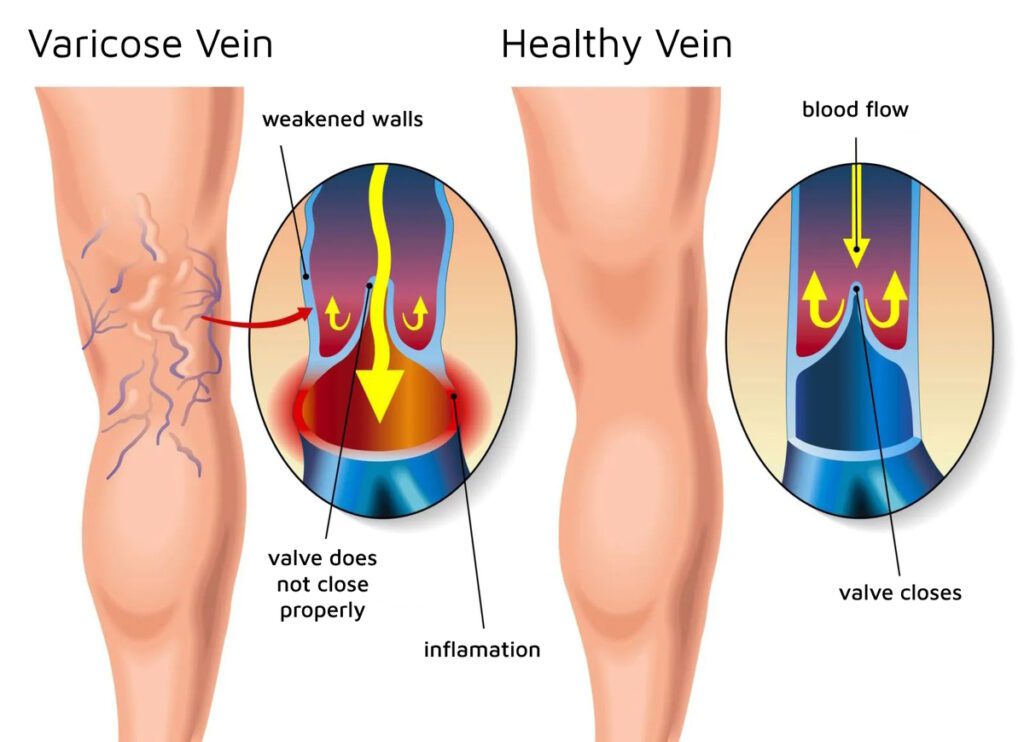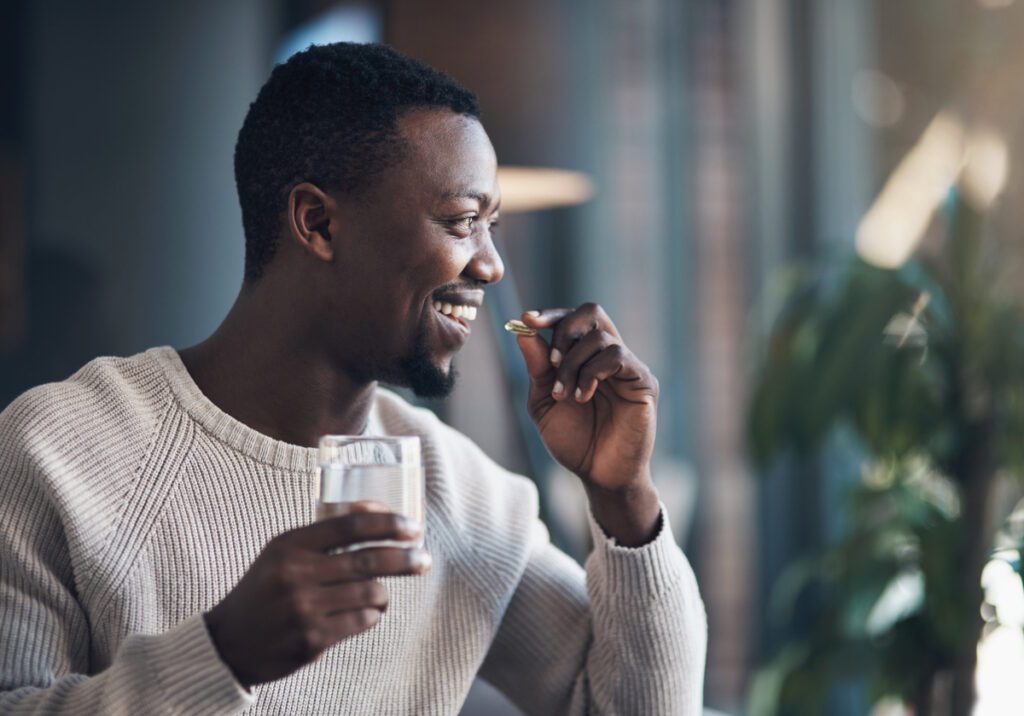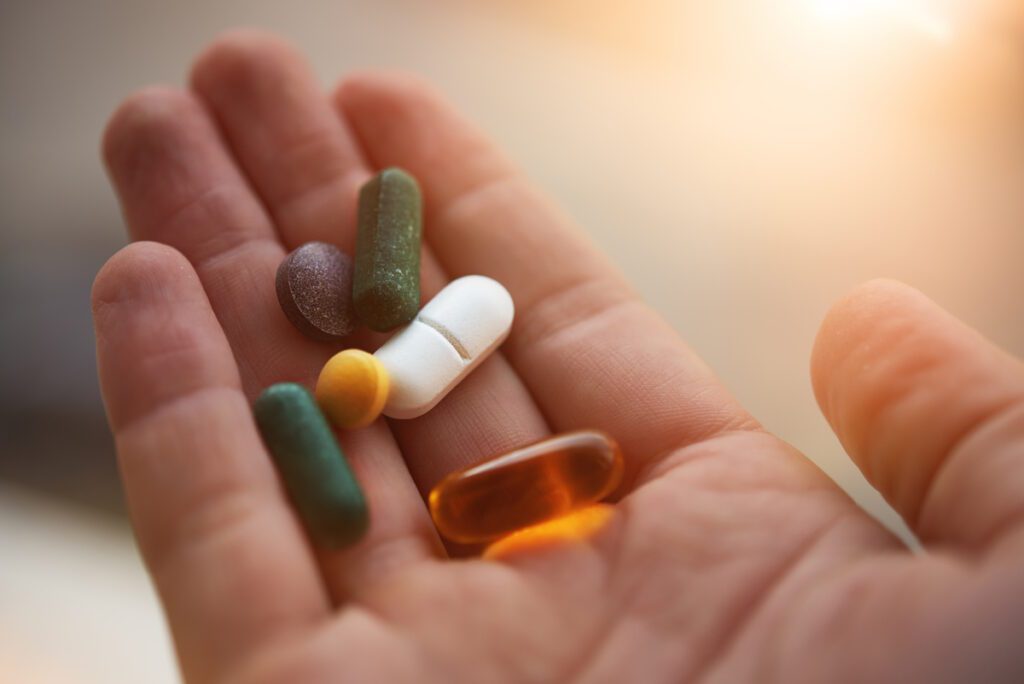Do Vitamins Help with Varicose Veins?
Author: StrideCare Internal Team

It’s no secret that healthy eating is one way to improve vein health and reduce your risk for varicose veins. Beyond weight control and looking and feeling better, the good stuff you put into your body impacts everything from blood circulation to cholesterol, inflammation, and potential venous diseases that may start as unsightly bulging varicose veins but lead to painful symptoms. But don’t rely solely on the grocery store’s vegetable and fruit aisle to improve or prevent varicose veins. A lot of what you need is also in the vitamin section. March’s National Nutrition Month® is a perfect time to focus on the importance of making informed choices about supporting vein health with nutritional supplements.
Many of the healthy foods we eat already contain the vitamins and nutrients we need to function and stay healthy. So, by all means, load up on as many leafy greens, fiber-rich foods, whole grains, and fish as possible. But you can also find them in bottle form as a dietary supplement. Knowing which vitamins help with varicose veins will go a long way in giving you control over how you live your life moving forward.
What Are Varicose Veins?
Varicose veins are twisted, ropey, discolored bulging veins that can develop on your legs. Roughly 25 percent of men and women in the United States have them. For those who aren’t in any pain as a result of these varicose veins, they are simply seen as an ugly fact of life. No more bikini season. No more shorts or skirts. It is what it is. What many people don’t realize, however, is that varicose veins are often signs of a more severe condition that can worsen if left untreated.

Varicose veins appear on your legs because there’s a blood flow issue. Your veins are a network of powerful vessels, and their sole purpose is to carry blood back to the heart. That’s easier said than done when you consider they are working against gravity. But healthy veins are always up to the task. The problem is when your veins aren’t healthy, usually because of poor diets, age, alcohol, smoking, obesity, etc. Rather than flowing freely throughout veins to support systems critical to cardiovascular health, blood can flow backward and begin to pool in your extremities.
This is why your veins begin to stretch, swell, enlarge, and even become twisted. The result is a variety of symptoms that can impact your quality of life, such as:
- Achy or heavy feeling in your legs
- Burning sensation
- Throbbing, muscle cramping, swelling
- Pain that worsens after sitting or standing for long periods
- Itchy skin or leg skin discoloration
- Numb or tingling legs
Since we’re talking about the foods we eat, a few of the main culprits that exacerbate vein issues and varicose veins include pretty much anything you’d expect that’s likely a part of your current diet:
- Fried food and fast foods like pizza, French fries, fried chicken, milkshakes
- Foods with added salt, sodium, and sugars like canned goods and processed meats
- Refined carbohydrates like sodas and cereal
- Caffeine
Caffeine alone elevates blood pressure and places an immediate strain on your veins. Per the American Heart Association, salt and sodium in your bloodstream pull water into your blood vessels and increase the amount of blood inside them. Naturally, this increases blood pressure, and over time, this stretches the blood vessel walls and creates plaque that can block blood flow.
What Are the Best Vitamins for Varicose Veins?
While it is important to avoid bad foods like the ones mentioned above, it’s also imperative that you replace those foods with healthier options and vitamin supplements that help you maintain a healthy Body Mass Index, boost your energy so that you remain active, and promote overall blood circulation.

Do Vitamins Help with Varicose Veins? Yes! Below Are a Few to Consider:
Vitamin C
Beyond being a great way to battle the common cold, Vitamin C is a key antioxidant in reducing inflammation, improving circulation, and keeping your veins strong. The body’s natural ability to produce collagen as we age is also a culprit in damaged veins, and Vitamin C can replace that missing ingredient. You can find Vitamin C in anything that is citrus-related, as well as onions, spinach, tropical fruits, potatoes, peppers, and broccoli. But if you don’t like eating those things, Vitamin C pills can help supplement.
Vitamin B
B vitamins include B6, B7 (biotin), B2 (riboflavin), and B1 (thiamin), among others. And they are great because they serve several health purposes, including lowering cholesterol, improving blood circulation, and eliminating the threat of blood clots. They can also repair damaged varicose veins when taken consistently over time. Top sources of Vitamin B include meat, poultry, dairy products, legumes, and leafy greens.
Vitamin E
According to at least one study, Vitamin E prevents deep vein thrombosis (blood clots), especially in women, because it prevents the formation of plaque and keeps blood from getting too thick and sticky. Vitamin E can be found in mangos, avocados, olive oil, pumpkin, nuts, seeds, fish, and dark leafy greens.
Vitamin K
Vitamin K is not as widely known as the other vitamins on this list, but it plays an integral role in varicose veins. This includes strengthening capillaries and even preventing varicose veins. Vitamin K can also be found in leafy vegetables, eggs, lettuce, and broccoli.
Varicose veins don’t cure themselves. You can’t prevent them completely and can’t impact their appearance by doing the same things you’ve always done. But exercise, avoiding smoking, eating better, and focusing on the vitamin supplements mentioned above have shown to improve vein health.

StrideCare Can Help With Varicose Veins
Please don’t let your varicose veins impact your life. If left unchecked, varicose vein symptoms can worsen and lead to more serious complications, such as chronic venous insufficiency. Sadly, so many people think they are stuck with their painful or unsightly varicose veins, and that wearing pants more often is now an unfortunate way of life moving forward. But the reality is that your varicose veins and their symptoms can be treated. In many instances, the underlying cause of your varicose veins is vascular-related and can be managed with the appropriate level of care and the right team of vascular specialists.
StrideCare physicians are board-certified, with additional fellowship training in minimally invasive vascular procedures. If your veins need treatment—or you have questions on how to avoid the onset of venous disease—the experts at StrideCare will recommend an individualized plan to help you get the best results. Request an appointment for a vein disease evaluation to discuss your options.
Prior to starting any new treatment or questions regarding a medical condition, always seek the advice of your doctor or other qualified health provider. This information is not a substitute for professional medical advice.
StrideCare serves the South Texas area including Houston, San Antonio, Austin, Round Rock, Bastrop, Brushy Creek, Cedar Park, Converse, Georgetown, Hutto, Kyle, Leander, Marble Falls, New Braunfels, Pasadena, Pearland, Pflugerville, San Marcos, Schertz, Houston, Sugar Land, Katy, Webster, Bay City, Clear Lake, Lake Jackson, The Woodlands, Universal City, Spring, Kingwood, Stafford, Conroe, Texas City, Cypress, League City, Bellaire, and more.


